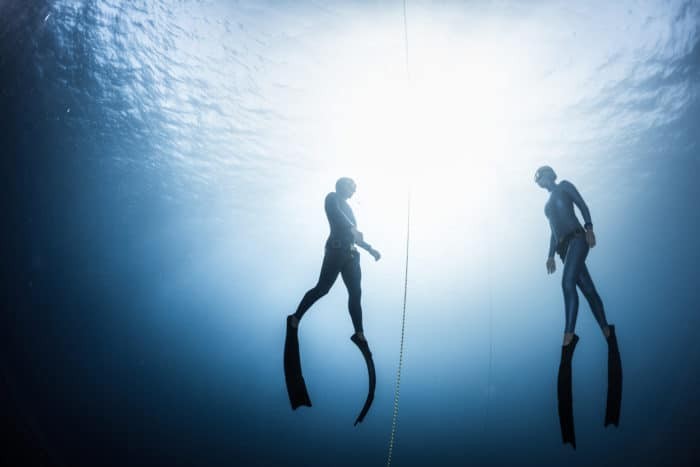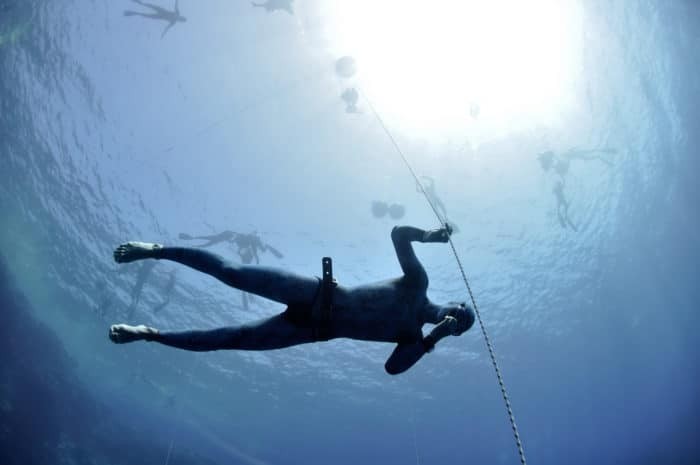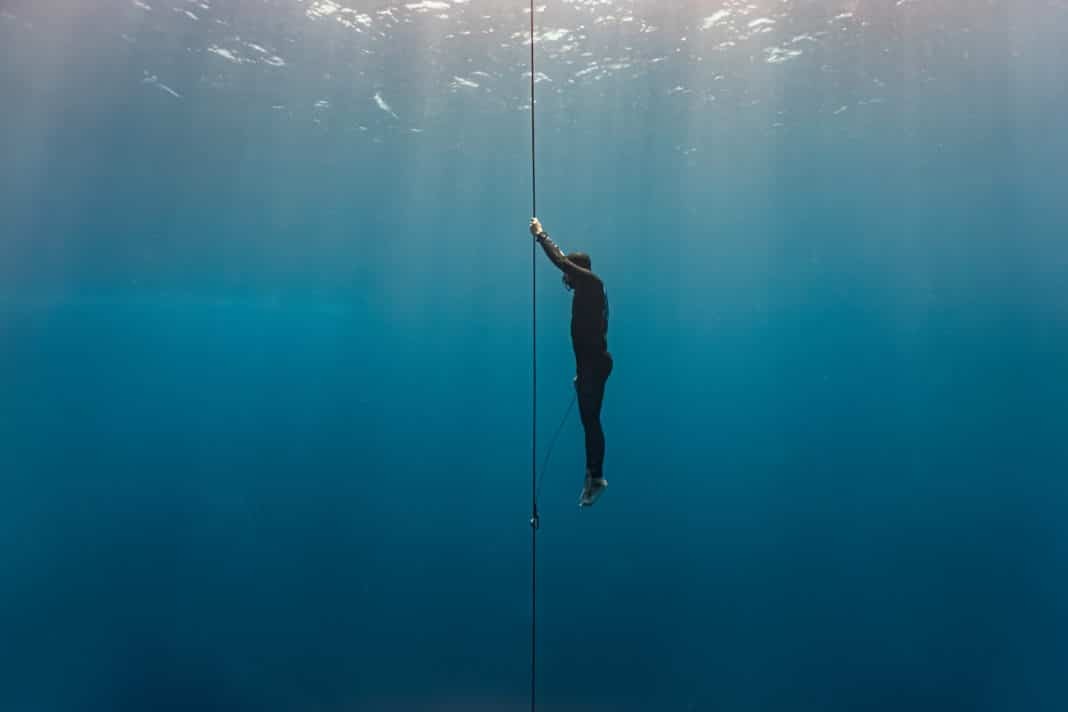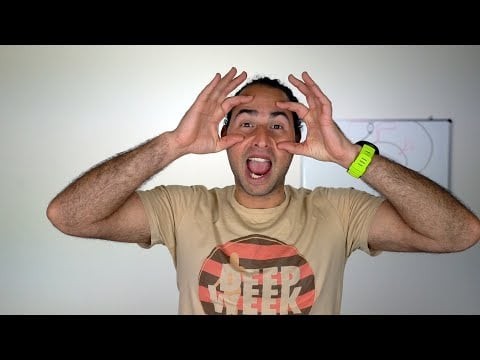Equalization techniques in freediving come naturally to some, while others must spend a great deal of time practicing, training, and maintaining technique. When you are just starting your journey into freediving, learning Frenzel equalization can be confusing and difficult, as it is not something we do in our daily life. It can be even harder to do when you are underwater and diving head-first. If you are having equalization issues with Frenzel at depths of around 35m (115ft) or shallower, check out these common equalization mistakes freedivers make while diving.
Incorrect/mixed Technique
Incorrect Frenzel technique (or not enough range of movement in the tongue) can often be a culprit if you are having trouble just getting to 5-7m (16-23ft). A mixture of Frenzel and Valsalva techniques may be able to get you further than 5-7m, but performances will often be varied, such as being able to reach 12m (39ft) one dive and then only 7m (23ft) another dive. This is when equalization needs to be practiced over and over again in the dry, verifying that the technique is absolutely correct and making sure that it becomes a natural movement. If you have to think about each step while equalizing in the dry, then it will only be more difficult in the water, especially in a head-first position.
Equalizations also need to be full equalizations; if you only release half of the built-up pressure in your ears, it will only become harder to equalize as you dive deeper.
Descending Too Fast
Descending too quickly can considerably affect equalization. If your equalizations cannot keep up with your speed, your ears will end up with too much pressure, thereby causing you to have to equalize forcefully to release the pressure (which is not recommended). It is much more useful to descend slower so that your equalizations can keep up with your pace. Since relaxation also plays a part in equalization, descending slower can also help you maintain your state of relaxation so that your dives are not only free of equalization issues, but also safer, longer, and more pleasurable.
Equalizing Infrequently

There is no limit to how often you can equalize while you are freediving. The problem arises when you equalize too infrequently, and pressure builds up to a point where you need a stronger equalization to release the pressure. Pre-equalizing at the surface is also a key factor, as there are greater pressure changes between the surface and 10m (33ft).
When diving FIM (free immersion), make sure to equalize with every pull or every second pull and make it a rhythm so that you never have to miss an equalization. When diving CWT (constant weight), keep your hand at your nose throughout your descent so that when you feel the need to equalize, all you have to do is pinch your nose, rather than having to bring your hand up to equalize and then putting it back down at your side. Always make sure your mask is equalized (roughly at every 5m/16ft) throughout your dive as masks with built-up pressure make equalizing your ears more difficult.
Relaxation
If you are not relaxed while diving, there are multiple problems that will present themselves in your dives, one of them being equalization. You need to erase tension in all areas of your body, but especially in the face, neck, and torso, in order to facilitate equalization.
This means having a completely relaxed face while equalizing (no movement in the cheeks, forehead, or neck), keeping your head facing straight ahead or tucked in, and keeping your belly relaxed (many freedivers unintentionally hold a lot of tension in their bellies). If you are freefalling while holding the line, make sure to hold it near your leg and not stretched out in front of you or above your head.
Sometimes, the problem can be a proper-fitting wetsuit, cold water temperatures, or not having a long enough relaxation phase before your dive. Generally, beginners should relax for at least one minute or more before their dives in order to let their bodies and minds calm down before diving and to get their heart rates slower. The deeper you dive, the longer you can wait at the surface to remove tension in your body. Focus on finding a relaxation method that gives you the most sense of calm before a dive.
Hydration and Diet
Hydration and diet play a bigger part in equalization than people might think. As freediving is a sport that causes us to sweat and be out in the sun for extended periods of time (and also makes us pee a lot!), adequate hydration is essential when diving. Dehydration can cause sticky Eustachian tubes due to the decrease in the fatty tissue’s water content around the Eustachian tube. Proper hydration requires drinking a lot of water the day before diving, the day of, and the day after.
Diet in freediving can be trickier. If you are lactose-intolerant or gluten-intolerant, eating these foods can cause you to produce extra mucus, which will inhibit equalization. The same food recommendations do not work for every single person, and only you know which foods give you issues after consuming them. The day before and the day of freediving, play it safe by eating only food that you know will not bother your digestive system.
Sickness

Diving while sick is not recommended, not only because it takes all the fun out of it, but because it can affect equalization. When we are sick, our upper respiratory system swells and becomes congested with mucus. This mucus can block the entrances in and out of sinuses, and can also block the Eustachian tubes. This blockage may cause some freedivers to try and equalize harder (which disrupts relaxation), barotrauma of the ears or sinuses, or a reverse squeeze upon ascent. Decongestants are not recommended because no one knows the effects of pressure and medicine, meaning that medicine can wear off mid-dive.
If you have chronic allergies, speak to a physician about your options. Also, avoid sleeping in air-conditioning or having a fan blowing directly at you all night as this can dry out your sinuses, which will cause more mucus production.
Physiological Issues
If you hear any strange sounds such as crackling, hissing, or squeaking when you equalize, or have proper Frenzel technique but are still unable to achieve equalization, you may need to see a physician. A diving or ENT (ear, nose, and throat) doctor who is familiar with the anatomy involved in equalization can take a closer look and give further advice on what the problem is and how to fix it. Adam Stern has an excellent video that goes over some stretches for your Eustachian tubes if you suspect that stiff Eustachian tubes are a problem, but in the end, a physician will know more by looking at you and determining the issue.
Final thoughts
It is important to remember that many people have trouble with equalization while freediving, whether they are absolute beginners or seasoned freedivers. Rushing the learning process will only hinder your progress; the key is patience, practice, and perseverance. If you continue to have trouble over a longer period of time, it may be a good idea to work one-on-one with a freediving coach who is experienced with equalization issues and can see your dives up close.
Do not feel discouraged and remember that everyone will experience problems with equalization at some point in their freediving journey; you are not alone! And most importantly, always dive with a certified freediving buddy, and never alone.


